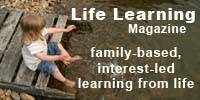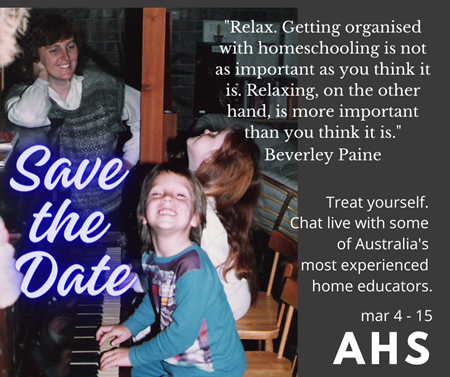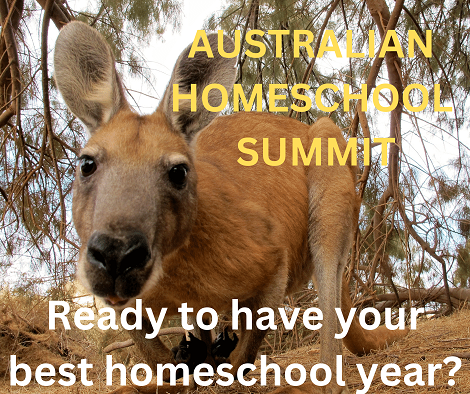|
School-at-Home Lesson Starters
Beverley Paine
In our early years when we were following a school-at-home approach before I became confident and comfortable with unschooling I found using lesson starters quite useful to settling the children down as well as getting me in the best frame of mind for teaching.
Lesson starters have a number of different purposes. They can be used to find out what the children already know before introducing new topics. As said above, they are good at engaging the attention of the children and help with motivation. This means that they don't take too long to get into working on the subject and start to drift off. One of th ways I found very useful for enagging their attention was to provide a challenge which would direct their thinking towards what we were about to do or what I wanted them to do. It also helped to alert them to the objectives of the lesson, or what I expected them to do.
Any lesson requires careful planning and preparation. This initial stage of engagement requires particular attention though. A lot of families tell me that they don't know how to get their children to do what they want them to, especially when it comes to subjects in which the children don't demonstrate any personal interest. Getting the lesson started well often translates into sustained interest and motivation so it is worth spending some time thinking about how to start. .
It is important to deal decisively with distractions. I did this by thinking about all the different tactics my children had previously used to avoid attending to the lessons! Make sure they have access to drinking water on the table and perhaps a nutritious snack. Advise them to use the toilet as they will be starting studying in five minutes. It is very important to give your children notice that lessons will start: I would tell them ten minutes before I wanted them to start to pack away whatever they were doing, and then remind them five minutes later. This is only reasonable and is actually very effective.
Children thrive on routine so it is also important to adhere to planned timings. Start on time if you can and don't go over time unless the children ask for it. Even then, don't let running over time interrupt another planned activity unless everyone is happy and you can easily slot it in elsewhere without too much disruption. This will help the children learn how to organise their own time, especially later on as they fill their life with more activities and committments outside of the home.
Be on hand to provide support and instruction as the children progress through their lesson or study. Often I sat with my children giving them 100% of my attention, but for some lessons it was okay for me to be in the same room attending to chores or something I needed or wanted to do (sewing, for example). Giving immediate answers offered less opportunity for distraction. It also meant that I was able to offer extra help or more complexity as needed. Supervising meant I was constantly evaluating my children's education and gave me the confidence I needed to plan our homeschooling learning programs.
Lesson starters need to fit in with the overall lesson and be in tune with your children's individual learning needs. Because we are educating different ages we need to make sure that the content engages each child at his or her level. Older children often help out with engaging younger children, but don't let this get in the way of them being challenged sufficiently.
If you are using self-instructional lesson starters (for example, within a unit study) make sure that they aren't always the same - vary the types of lesson starters you use. Make sure the instructions are clear and precise - think about how a child might interpret them. What often makes sense to an adult doesn't to a less experienced person.
A good starter will be a thinking or doing task that engages the learner. It should get the child thinking, perhaps about a question or a problem to solve. This type of challenge needs to be set at the child's level and take into account prior learning and understanding. If it is too challenging the child will feel defeated and stop thinking. If it is too easy they will quickly do the task and learn little. Humour is a good tool to use. Making the task meaningful to the child's life and experience also increases motivation.
Lesson starters establishes the tone of the rest of the lesson. Because they are an introduction they need to be kept short, no longer than five minutes.
Teachers use a huge variety of lesson starters in classrooms that also unrelated to the rest of the lesson. These often focus the children's attention that now is the time to 'put their thinking caps on' and learn. Here a few I picked up from an old teacher's manual I was given by a friend:
- Using a prepared set of cards with lists of similar objects or statements, but with one not matching. The children have to call out the one that is the odd one out. For a simple version, use playing cards - they need to pick the different suit or number. Making sets of cards like this can be an educational activity for the children too - you can pick any subject from which to create the lists.
- Give clues about different places, people and things and ask the children to try to guess. For younger children pick things around the home.
- Select an object, picture or sound that relates to the planned lesson and ask who, what, where, when and why questions about the picture. Or, keep the picture hidden and give clues - children love a mystery!
- Another starter is asking "give me 10 words which describe..." - link the object or action you want described to the content of the lesson.
- Spot the difference or compare and contrast two different pictures or photos. .
- If using a picture or a photo, ask the children to imagine that they are in the image - what are they thinking, what are they doing, why, etc.
- Role play - introduce the lesson by getting the children to act out a sequence of events, or give a pretend eyewitness account.
Throughout the lesson keep tabs on what the children are thinking and learning by asking open ended questions or making comments that encourage the children to share. This isn't a time for testing their ability but for you to check that they aren't experiencing any difficulty with the material or concepts. This will help you plan the content of the next lesson so that it builds on what your children have learned. It also helps the children to stay focused and engaged, as well as giving them confidence to clarify anything they don't understand.
During my school-at-home years l developed a habit of reflecting on my children's learning
while it was happening as well as later. This stimulated my interest and curiosity about how they each learned as well as the subject and different ways it could be taught.

Was this article helpful? Was it worth $1.00 to you?
Your gift of $1 or more helps to keep this site operating
offering encouragement
and reassurance to families
wanting
better outcomes for their children.



Beverley Paine with her children, and their home educated children, relaxing at home.
Together with the support of my family, my aim is to help parents educate their children in stress-free, nurturing environments. In addition to building and maintaing this website, I continue to create and manage local and national home educating networks, help to organise conferences and camps, as well as write for, edit and produce newsletters, resource directories and magazines. I am an active supporter of national, state, regional and local home education groups.
"You've been an inspiration to me, I love the way
you really listen to people." Vanessa
"Whenever I read your writing I always come away
with increased confidence in my ability to provide and
share a wonderful learning journey with my family!" Davina
"Your guidance, understanding, support and words of
wisdom changed our lives. We now offer support and
organise many homeschooling events for others." Lesley
"Thank you once again for your prompt and friendly service.
I am convinced that your books are going to add
quality and peace of mind to my journey of teaching my kids
at home! Just from studying your website, until almost
2am
in the morning, I 've been encouraged!" Louisa
"Thank you for all your many,many reassuring words
over many, many years. You probably don't know exactly how
valuable you are to the Australian Home Education community.
I've been reading your stuff for maybe 8 years or more now.
And I'm very grateful." Gythaa


CLICK HERE
if you want to learn
how to write your own education plans
to suit
your unique children's
individual learning needs?
Or you are looking for quality curriculum and teaching tips...
|
|
Welcome to the World of Home Education
and Learning without School!
We began educating our children in 1985, when our eldest was five. In truth, we had helped them learn what they need to learn since they were born. I am a passionate advocate of allowing children to learn unhindered by unnecessary stress and competition, meeting developmental needs in ways that suit their individual learning styles and preferences. Ours was a homeschooling, unschooling and natural learning family! There are hundreds of articles on this site to help you build confidence as a home educating family. We hope that your home educating adventure is as satisfying as ours was! Beverley Paine
3 ESSENTIAL STEP BY STEP GUIDES
Let experienced home educators Beverley, Tamara and April walk you through HOW to create a learning plan that builds on solid foundations that works for YOUR family AND ticks all the boxes for home educaton registration!
|

Tap into Beverley's
experience
through her books
"Your books, your blogs helped me beyond words... they helped me to find comfort in knowing it is ok to choose exactly what is best for my family." Nisha
"Your books and information are mind blowing and already I am feeling good about this new experience." Diane
"Your guidance, understanding, support & words of wisdom changed our lives." Leslie
"I feel specially inspired by Beverley's words and, the more I read her comments, the more inspired I feel, since my need for support, respect for different parenting styles, and information are fully met." Marijo
|
 |
|

The information on this website is of a general nature only and is not intended as personal or professional advice. This site merges and incorporates 'Homeschool Australia' and 'Unschool Australia'.
The Educating Parent acknowledges the Traditional Aboriginal and Torres Strait Islander Owners, the Custodians of Australia, and pay our respects to Elders past and present and extend that respect to Aboriginal and Torres Strait Islander people viewing this website.

Advertise on this site.













Australia's premier online annual conferences, lifetime access to video and audio recordings, freebies, notes and associated resource guides.
EVERY SUMMIT IS UNIQUE!
$29 each  2023 2023   2022 2022   2021 2021
$25 each  2020 2020  2019 2019   2017 2017
"Biggest and best Aussie homeschool event of the year!"

Home education is a legal alternative
to school education in Australia.
State and Territory governments are responsible
for regulating home education and have different
requirements, however home educating families
are able to develop curriculum and learning programs
to suit the individual needs of their children.

Without revenue from advertising
by educational suppliers and Google Ads
we could not continue to provide information
to home educators. Please support us by letting
our advertisers know that you found them on
The Educating Parent. Thanks!
|
![]() About
About
![]() Blog
Blog
![]() Articles
Articles
![]() Curriculum
Curriculum
![]() Resource Directory
Resource Directory
![]() Shop
Shop
![]() Kids Pages
Kids Pages
![]() Facebook
Facebook

![]() SA
SA ![]() VIC
VIC ![]() NSW
NSW ![]() QLD
QLD ![]() TAS
TAS ![]() ACT
ACT ![]() NT
NT ![]() NSW
NSW ![]() QLD
QLD ![]() SA
SA ![]() WA
WA ![]() TAS
TAS ![]() ACT
ACT ![]() NT
NT 





















